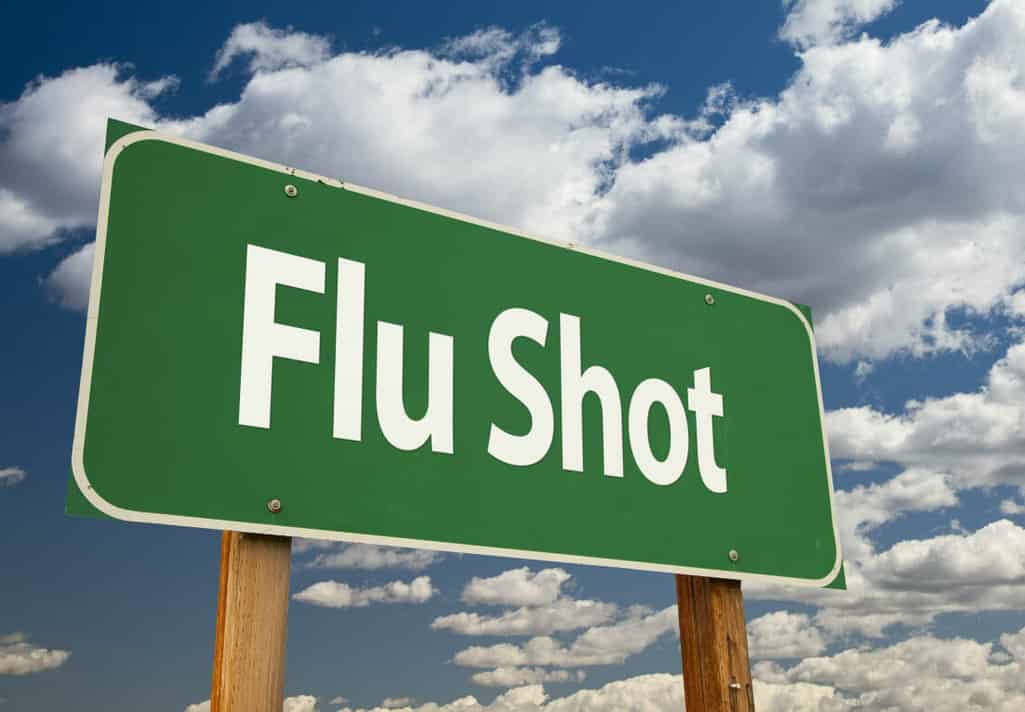
Both the Common Cold and Flu share many of the same symptoms, especially when symptoms first appear. Generally, Cold symptoms are milder and develop more slowly than Flu symptoms, which can progress from mild to severe quite rapidly.
We all know what the flu is – it’s a common term for influenza1), which is a highly contagious viral infection of the respiratory passages causing fever, severe aching, congestion, occurring from late Fall through the Winter season. It’s typically spread from person to person by coughing or sneezing. In addition to the above symptoms, the flu can also lead to pneumonia2), a serious infection or inflammation of the lungs, which can progress to hospitalization and in some cases, unfortunately, death.
Each Year’s Flu Vaccine is an Educated Guess
So does it work? The answer is more complicated than a simple Yes or No. Yes, the flu shot works. But no, it’s not a 100% guarantee that you won’t come down with the flu. How can that be?
In a nutshell, this is how the flu vaccine works:
“Flu vaccines cause antibodies to develop in the body about two weeks after vaccination. These antibodies provide protection against infection with the viruses that are in the vaccine The seasonal flu vaccine protects against the influenza viruses that research indicates will be most common during the upcoming season.3)
So which viruses is the CDC talking about? The answer is, according to the CDC:
… Traditional flu vaccines (called “trivalent” vaccines) are made to protect against three flu viruses; an influenza A (H1N1) virus, an influenza A (H3N2) virus, and an influenza B virus. 4)
It’s important to understand that the seasonal flu shot that you receive in the Fall or Winter is an attempt to vaccinate you against the three or four types of flu viruses that the WHO (World Health Organization) and CDC believe will have the most potential to cause flu outbreak in the upcoming Flu Season. It’s an educated guess. It’s a guess, however, based on accurate data. The FDA (Food and Drug Administration) makes the final decisions each February about which flu viruses the drug manufactures will target for the upcoming flu season. 5)
The degree of effectiveness of the flu vaccine (in any year) depends on several factors. Here is an overview.
Age
Generally, the following is true:
- Most effective in adults who are healthy.
- Less effective for young children under 2 years of age.
- The immune system become weaker as a person gets older. Since the flu shots works with your immune system, flu shots are least effective on older people (age 65+) but It’s still highly recommended because it reduces the effects of flu and make the flu symptoms milder even if a person get infected. But flu shot does not guarantee a complete prevention of flu in elderly people. 6)
Health
The key factor which depends on the effectiveness of the vaccine is a person’s general health because a strong immune system responds to the vaccine vigorously. Vaccine does not work properly in a body with a weak immune system.
Timing
Another factor which can affect the efficacy of the flu shot is timing. It is best to get yourself vaccinated as early in the flu season as possible. Since flu season usually reaches its peak in January or February, it’s recommended to get the flu shot as soon as the vaccine has been distributed in your community. Because as the flu season progresses the risks of catching flu becomes higher.
Once the flu season ends an annual flu shot is given for protection because the old vaccine loses its effectiveness.
Flu Strains
The effectiveness of a flu shot can vary depending upon the accuracy of the predictions of which flu strains are projected to become most prevalent and cause outbreaks or epidemic in your community. If the vaccine is not well matched to the flu virus(es) that are circulating and spreading flu, then the vaccine will be less effective in any given community. When the vaccine is well matched, then very substantial benefit and protection from the flu (both in avoiding flu infection and lessening the severity and/or duration of the illness in those who still become infected even after receiving the shot).
Can the Flu Vaccine cause the Flu? Can I get the Flu from the shot?
No. The flu vaccine contains inactivated virus. This means that the viral material in a flu shot are no longer infectious, and cannot infect you. Since there’s an incubation period of approximately 2 weeks from the time you get the shot until your immune system has built up immunity to the virus strain(s) that your flu shot was designed to delivery, you can still catch a cold, the flu, or other bacterial/viral infection during this period. Though there’s a correlation between getting a shot and then getting sick, the flu shot is not the cause! Having clarified this issue, it’s still important to note that getting any vaccine can cause side-effects such as:
- Soreness, redness, and/or swelling from the shot
- Headache
- Fever
- Nausea
- Muscle aches
Allergic reaction is also possible. 7)
Final Word
Flu shots are a safe way of minimizing the risk of catching flu but it is not a completely fool-proof method of preventing a flu infection. The bottom line is that the flu shot can and does reduce the risk of flu illness by about 50-60% in flu seasons when the vaccine is well match to the virus strains in circulation during the flu season. Here are three big reason to get the flu shot:
- It can prevent you from getting the flu.
- If you get the flu, you might become less sick, recover faster than if you had not had the flu shot. You will also be less likely to get pneumonia or require hospitalization.
- If getting the flu shot keeps you from getting the flu in the first place, you can’t spread the flu to other people. Even if you think you can ‘handle’ the flu, there are people in higher risk groups for whom getting the flu can result in serious complications or death.
Modern flu shots are safe enough even to be given to pregnant women. There are flu shots now that are safe for people with egg allergy. Be sure to discuss concerns with your provider when planning your vaccination. Your providers at Family Medicine Associates would be happy to answer any additional questions you may have. 8)
Video Sources
“Misconceptions about Flu and the Flu Vaccine”
Uploaded by: Centers for Disease Control and Prevention (CDC) , YouTube.com
“Flu Attack! How A Virus Invades Your Body”
Uploaded by: NPR (NPR.org), YouTube.com
Sources and References
| ↩1 | Center for Disease Control and Prevention https://www.cdc.gov/flu/keyfacts.htm |
|---|---|
| ↩2 | Center for Disease Control and Prevention https://www.cdc.gov/pneumonia/index.html |
| ↩3, ↩4 | Center for Disease Control and Prevention https://www.cdc.gov/flu/protect/keyfacts.htm |
| ↩5 | Center for Disease Control and Prevention https://www.cdc.gov/flu/about/season/vaccine-selection.htm |
| ↩6 | Center for Disease Control and Prevention https://www.cdc.gov/flu/about/qa/vaccineeffect.htm |
| ↩7 | WebMD “Flu Shot: The Vaccine and Its Side Effects” http://www.webmd.com/cold-and-flu/flu-guide/flu-shot-facts#3 |
| ↩8 | Center for Disease Control and Prevention https://www.cdc.gov/flu/about/qa/vaccineeffect.htm |
